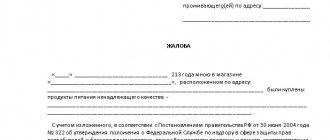Parents and legally appointed guardians have a responsibility to provide adequate care for their children and to promote their full development. If any civilian (school, kindergarten, or just neighbors) has reason to suspect a parent or guardian of non-compliance with the rights of the child, he has the right to submit an application to the guardianship of the child’s mother for an inspection.
The guardianship and trusteeship bodies (TBO) are a state executive organization that performs supervisory functions. With their help, all issues related to violation of the rights of minors are resolved.
Inappropriate upbringing and care of a child
Inadequate upbringing and care of children implies failure to fulfill parental responsibilities. Minors have the right to receive care and attention from their parents or guardians. If adults do not participate in the lives of children, do not monitor their health, or abuse their status, this is a reason to file an application for guardianship of the father or mother. It is especially important to report a family where there is mental, physical or sexual abuse. A protocol on non-compliance with the duties of a parent is drawn up by employees of the internal affairs bodies. The case of this offense is being considered by the Commission on Juvenile Affairs.
Bad or good: how to understand the truth
According to Art. 63 of the Constitution of the Russian Federation, raising children is the duty and right of parents, regardless of where they are, who must provide the conditions required for the good mental, social and physical development of the child.
There is no precise definition of what constitutes “good or bad” parenting. The Family Code does not mention the living conditions in detail that parents (guardians) provide to the child.
The interpretation of “non-participation of parents in the child’s life” is also a very conditional concept. This includes unfortunate drunkards who have difficulty remembering during a visit to the PLO that they have children, and businesswomen whose weekly schedule includes barely 30 minutes of personal time for their child.
Grounds for appeal
The basis for applying to write an application to the guardianship authorities may be:
- Poor living conditions for children. This includes families who do not maintain cleanliness in the house, and do not monitor the neatness of their children’s clothing and appearance. In some cases, the minor may miss school or even go hungry. All this is a reason to submit a request to check your living conditions.
- Leaving a child in danger. An application to the department of guardianship and trusteeship about a violation of rights is submitted if a minor is in danger due to the negligent attitude of adults.
- Abuse of parental rights. If parents do not allow their children to fully develop: communicate with peers, attend clubs or sections, teach them bad habits, then this allows them to be brought to administrative responsibility.
- Cruel treatment. According to the law of the Russian Federation, neither psychological (threats, intimidation) nor physical (punishment, beatings) violence can be used against children. Any impact may serve as grounds for filing an application with the guardianship authorities for improper upbringing.
- Alcohol or drug addiction of the father or mother. Eyewitnesses of this fact must write a letter to the guardianship to check the conditions of the child’s detention.
This list is not complete. There may be many more reasons to file an application with the guardianship authorities. Responsible citizens, at the first suspicion of non-compliance with parental responsibilities, should contact the relevant authorities. Those who do not wish to give away their identity can report a dysfunctional family anonymously.
Is it possible to complain about neighbors anonymously?
Please note that all applications from citizens are not considered only if the applicant has provided invalid information about himself or an address for a response.
This can also include the receipt of a duplicate of a previously accepted application in electronic form. If the complaint was drafted incorrectly, it will also not be accepted for consideration. It is worth noting that applications that do not have the applicant’s personal signature are also not considered.
Dear readers! To solve your problem right now, get a free consultation
— contact the on-duty lawyer in the online chat on the right or call:
+7
— Moscow and region.
+7
— St. Petersburg and region.
8
- Other regions of the Russian Federation
You will not need to waste your time and nerves
- an experienced lawyer will take care of solving all your problems!
Who can apply
The following citizens can file a complaint and write a letter to the PLO:
- one of the parents (to establish the place of residence of a minor under fourteen years of age);
- employees of educational organizations (employees of kindergartens or schools);
- specialists from a medical institution (a doctor from a clinic, for example, a pediatrician);
- any of the relatives (grandmother, grandfather, aunt, uncle).
An appeal to the LLC can be submitted in person to the branch at your place of residence or sent by registered mail via Russian Post.
If a person who wishes to remain anonymous wants to convey a signal about the family, then on the Internet you can find a contact phone number to call.
Consent from the child
In order for guardianship to be formalized by the applicant, he must obtain the consent of the child, which must be presented in a previously approved written form.
This application should be drawn up and filled out using a special form, which can be found below.
This point is important and requires mandatory implementation in order to obtain custody of a child under eighteen years of age.
When necessary
The child’s consent to guardianship is necessary because when transferring him to a new family, the guardianship authority is first guided by the interests of the child himself.
The important point is that in the process of registering guardianship, the deciding vote is the permission of the orphan who has reached the age of ten.
Sample
A sample of the child’s consent to guardianship is provided by the relevant organization dealing with this issue. The completed sheet must contain a positive response to the request for guardianship by the applicant.
It is important to note that only children over ten years of age can consent to guardianship. Registration of guardianship is impossible without their consent.
Rules for drawing up an application to the guardianship authorities
The petition is drawn up in free form at the discretion of the applicant. The main thing is to adhere to the general rules for official communications:
- Registration of the “header” (department address, applicant’s details).
- Description of the situation (it is important to write who the applicant is as a minor and talk about the reasons that prompted him to contact the executive authorities).
- Petition (for example, a petition to check the conditions of detention of children).
Also, if available, photographs or videos relating to this issue can be attached to the application.
For those who find it difficult to compile, sample applications to the guardianship and trusteeship authorities, as well as a sample application for guardianship, are provided on the Internet on the website of the Ministry of Education. Which can be used as templates or examples. You can also contact the PLO for help. Employees of the organization will provide a sample and help you prepare the document correctly.
Harmful mistakes
The human factor plays an important role in the fate of a child. Often a social teacher (psychologist) from a school writes a statement with a request to check the family on a fact that has no reason to consider it dangerous. At the same time, this same teacher turns a blind eye to flagrant cases of lawlessness, bullying, and psychological pressure.
From life! In any educational institution there are “victims” who are humiliated and beaten by their peers because of their poverty and unwillingness (inability) to fight back against their offenders. In almost 99% of cases, teachers (psychologists) turn a blind eye to this fact, not wanting to conflict with class leaders and discredit the status of a decent school, although this is a direct fact of improper child upbringing!
At the same time, showing unnecessary activity and the appearance of work, the teaching staff zealously begins to ruin the lives of children and parents who do not have enough funds to reach an “above average” level. Thus, the PEP receives applications based on an inspection of the living conditions of students, where the lack of a child’s own room, good repairs, furniture, and technical devices is considered improper education.
Supervisory authorities of guardianship and trusteeship
The work of the educational institution is controlled, in accordance with current legislation, by Rosobrnadzor, the federal service for supervision in the field of education and science.
Rosobrnadzor's tasks:
- checking the activities of the POO;
- consideration of citizens' appeals on public education issues;
- monitoring the correction of found violations.
The work of the department is also monitored by the department for supervision and control of the activities of executive authorities of the Russian Federation.
Procedure upon receipt of an appeal
After receiving a complaint, executive authorities consider the request within 1 month (in extreme cases, the period may double). After which they are obliged to provide the applicant with an official response with the decision made. The processing time directly depends on the accuracy of the data provided. If the complaint was filed without justification, due to personal animosity, the family has the right to file a claim for false information.
If, after an inspection, employees establish facts of non-compliance with parental responsibilities, they make a decision to register the family.
In case of cruel treatment (beating, sexual violence), the authorized body notifies the prosecutor's office and writes a petition for deprivation of parental rights.
If children in care are subject to inadequate care, the OPP returns them to the shelter.
What responsibility do parents have?
In case of improper performance of their duties, parents or legal representatives may be subject to punishment. Types of responsibility:
- Family law. Occurs due to a socially dangerous situation. The family is put in control.
- Administrative. If a mother or father cannot ensure the safety of the life and health of their children, they are subject to administrative liability (a warning or a fine).
- Civil law. For harm caused to a minor, a parent or legal representative may be deprived of parental rights.
- Criminal. A serious crime against a child faces criminal liability and a real prison term.
It is important to remember that deprivation of parental rights and imprisonment do not relieve parents from the obligation to support a minor.
Guardianship procedure
The currently existing family legislation was created in order to protect the needs of the future of our country, including the right of each of them to have their own family and be raised in it.
It is the most important and fundamental of all rights existing today.
The legislation states that new parents are immediately entrusted with a great responsibility, which consists in supporting children who have not yet reached adulthood. Guardians are obliged to take care of their well-being in all areas of life, health, participate in their development and create comfortable living conditions.
Unfortunately, today, many children are deprived of such simple happiness as a family. And this happens for various reasons: not always the fault of the parents. Due to various circumstances, a child may remain an orphan and then he is transferred to the authorized bodies or to the care of guardians.
Guardianship is a type of definition of children when they are accepted into a new family not as a half-blooded child, but for upbringing. It is important to note the fact that it can only be issued for those children who have not yet turned fourteen years old.
For children older than this age, guardianship is applied. It consists of caring for and controlling a teenager until he comes of age.
There are several cases in which a guardian may be appointed for a child (who is under eighteen years of age):
- sudden death of both spouses;
- deprivation of parental rights;
- significant reduction of rights to the baby;
- recognition of both spouses as incapacitated or limited in their ability to work;
- parents ignore their direct responsibilities towards their own child, which relate to upbringing, maintenance and support;
- constant absence of parents near the child due to work activities (travelling on business trips, working abroad);
- absence of parents due to being in prison;
- the presence of unfavorable conditions that violate the established interests of a child who has not yet reached the age of majority;
- list of other circumstances.
Registration of guardianship is not an easy and rather lengthy procedure. In order for it to be successful, a whole list of necessary conditions must be met. Representatives of the guardianship authority participate in this action.
To persons applying for guardianship, these government organizations issue an opinion after a detailed analysis of the papers submitted with the application. Do not forget that without the conclusion of an organization with certain powers, subsequent registration will be impossible.
In order to clearly receive a conclusion that confirms the possibility of becoming a guardian, you should bring the following package of documents to the relevant organization:
- statement of initiative to become a guardian;
- certificate from the place of work, which confirms a stable financial position;
- a certificate confirming residence in a house or apartment and rights to it (her);
- a certificate confirming the absence of a criminal record and stay in places of restriction of freedom;
- a doctor’s report confirming the absence of fatal diseases;
- biography of the applicant;
- consent to guardianship of all members of the applicant’s family in writing;
- living conditions survey paper.
After a detailed analysis and study of all received documents, certificates and conclusions, the guardianship authority makes a final decision. If the applicant meets all the requirements, a positive verdict is issued.
After receiving a positive response, the person can take the following steps to formalize a child custody agreement.









